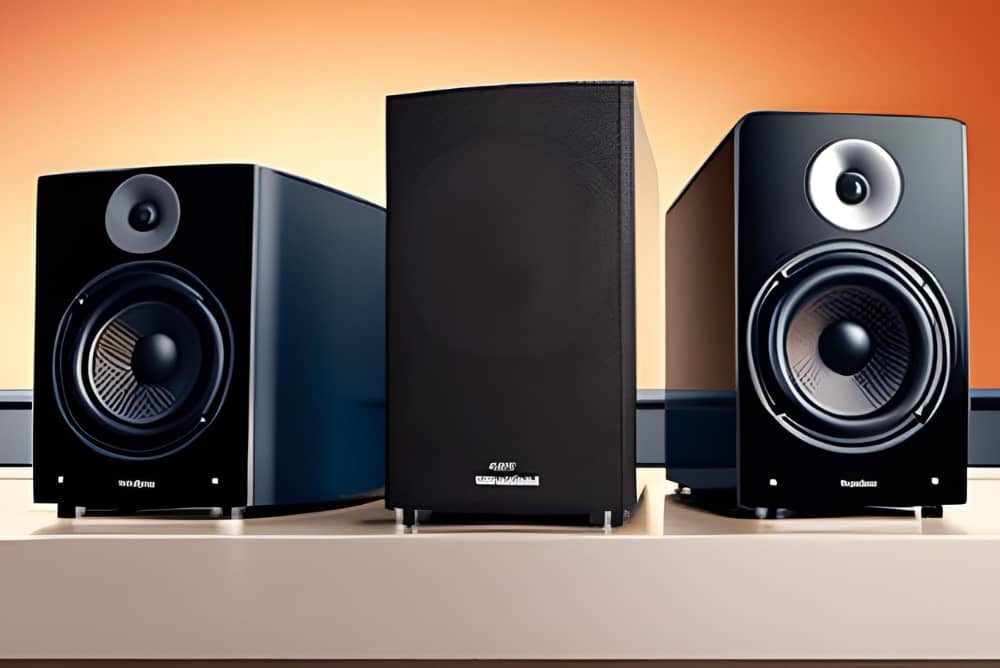“As an Amazon Associate, I earn from qualifying purchases. Without Any Extra Cost to You!”
Bookshelf speaker brands are an essential component of any home audio system. I have evaluated various bookshelf speaker brands and can attest to the importance of choosing the right brand for your audio needs.
When it comes to selecting the best bookshelf speaker brand, there are several factors to consider such as sound quality, design, and price.
In this article, we will explore some of the top bookshelf speaker brands in the market and provide an in-depth analysis of their features, performance, and customer reviews. We will also provide useful tips on how to choose the right bookshelf speaker brand based on your specific needs and budget.
Bookshelf Speaker Brands
When it comes to bookshelf speaker brands, there are numerous options available in the market, each with its own unique features and performance capabilities.
- Klipsch: speakers deliver crisp, clear sound that is perfect for both music and home theater applications. To learn more about these bookshelf speaker brands and their unique features, check out
- KEF : offers a range of bookshelf speakers with advanced driver technology and sleek design.
Check out our review of the acclaimed KEF LS50 Meta.
- Acoustics : affordable bookshelf speakers with a balanced and dynamic sound
- ELAC : specializes in creating bookshelf speakers with high-end components that deliver exceptional performance
- Polk Audio : on the other hand, is known for their versatile bookshelf speakers that provide clear, powerful sound for both music and movies.
Key Bookshelf Speaker Components
To understand what makes a bookshelf speaker a high-quality audio device, it is essential to know its key components.
- The driver : This component produces sound and is responsible for the frequency response and distortion levels of the speaker. lerar nore on pseaker driver here : https://en.wikipedia.org/wiki/Electrodynamic_speaker_driver
- The tweeter : Another essential component is the tweeter, which reproduces high-frequency sounds, such as cymbals and vocal harmonies: https://en.wikipedia.org/wiki/Tweeter
- Crossovers : Critical component in bookshelf speakers as they direct the frequencies to the appropriate driver.
- The enclosure : Responsible for the sound of the speaker, providing a resonance-free environment that produces clear, accurate sound
Bookshelf Speaker Brands Specifications
Bookshelf speaker specifications are crucial in determining the quality and performance of a speaker.
- Frequency response: critical specification that measures the range of frequencies a bookshelf speaker can reproduce
- Sensitivity : is another important specification that measures how efficiently a speaker can convert power into sound
- Impedance : is a measure of electrical resistance and is important when matching speakers to amplifiers.
- Power handling : is also an essential specification as it measures the maximum power a bookshelf speaker can handle without distortion
How to Choose the Right Bookshelf Speaker
Choosing the right bookshelf speaker can be a daunting task, but it doesn’t have to be.
Determine your personal needs and preferences. Think about the type of music you listen to and the type of sound you prefer.
Consider bookshelf speaker specifications. If you enjoy deep bass, you may want to consider bookshelf speakers with larger woofers or subwoofers. If you prefer a more balanced sound, look for bookshelf speakers with high-quality tweeters and midrange drivers. Match the speaker’s impedance to the amplifier to ensure compatibility. Check the speaker’s power handling to avoid distortion.
Consider your budget. Bookshelf speakers can range from affordable to high-end, so it’s essential to determine how much you are willing to spend. Keep in mind that higher-priced bookshelf speakers may offer better sound quality and durability, but this isn’t always the case.
Consider the size of your room. Larger rooms may require more powerful bookshelf speakers, while smaller rooms may benefit from smaller speakers that don’t overpower the space.
Finally, research and compare different bookshelf speakers before making a final decision. Look for reviews and customer feedback
Final words
Bookshelf speakers are an essential component of any home audio system, providing crisp, clear sound for music and movies.
For those looking for a bookshelf speaker with signature horn-loaded tweeters and clear, powerful sound, Klipsch is a great option. KEF offers a range of bookshelf speakers with advanced driver technology and sleek design.
Q Acoustics offers affordable bookshelf speakers with a balanced and dynamic sound. ELAC specializes in creating bookshelf speakers with high-end components that deliver exceptional performance.
Polk Audio is another notable bookshelf speaker brand, offering versatile speakers that provide clear, powerful sound for both music and movies.
If you are not sure and considering other type of speakers, check out review of 14 type of speakers.
FAQ
Are bookshelf speakers good for home theater?
Yes, bookshelf speakers can be a great choice for a home theater setup. They can provide clear and accurate sound for movies, TV shows, and music
Are bookshelf speakers good for TV?
Yes, bookshelf speakers can be a great option for TV audio. They can provide a more immersive audio experience compared to the built-in speakers of most TVs.
Are bookshelf speakers good for surround sound?
Yes, bookshelf speakers can be a great option for surround sound systems. They can be used as front or rear speakers, delivering clear and accurate sound for a more immersive audio experience.
Are bookshelf speakers good?
Yes, bookshelf speakers can be an excellent choice for those who want clear and accurate sound in a compact package. They can provide a great audio experience for music, movies, and TV shows.
Do bookshelf speakers need stands?
It depends on the design of the bookshelf speaker. Some bookshelf speakers are designed to be placed on a shelf or table, while others may benefit from being elevated on stands to optimize their sound projection.
